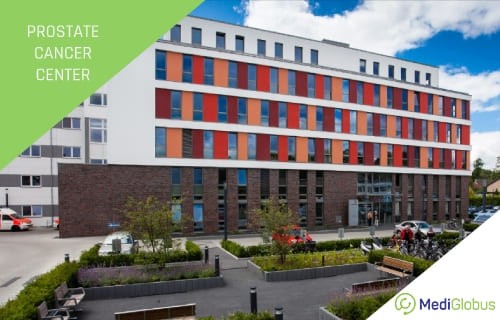Prostate cancer is on the fourth position in the ranking of the most common oncological diseases in the world. A distinctive feature of the disease is that prostate cancer in men occurs more often after 50 years. Timely diagnosis and effective treatment of prostate cancer plays a crucial role for men. Let’s look at how modern medicine can help.
TREATMENT OF PROSTATE CANCER THROUGH SURGERY

The main method of treating prostate cancer is surgical removal of the tumor, namely prostatectomy. Prostatectomy can be of two kinds: radical and partial. Partial removal of the gland is carried out in case of benign tumor. In prostate cancer, complete removal of the neoplasm and the surrounding tissues is performed.
There are three ways of surgical intervention: the perineal, the retropubic and the transvesical prostatectomy. The retropubic prostatectomy is performed through the incision in the peritoneum. Pros of this type of operation is the ability to remove a large tumor, as well as lymph nodes.
With perineal prostatectomy, the tumor is removed through the perineal incision. Drawback of this surgery is the lack of the ability to remove lymph nodes, as well as the risk of damage to the neural bundle and erectile dysfunction. Transtrusive prostatectomy, in turn, is the most traumatic and is used exclusively in cases when the tumor is so large that it can not be removed in any other way.
The success rates of surgical treatment of prostate cancer, for example in Israel is up to 92%.
TRANSURETHRAL RESECTION OF PROSTATE
Treatment of prostate cancer with the help of surgery can be carried out without incisions. Transurethral resection of the prostate is the endoscopic method, which consists in conducting the instrument (resectoscope) through the urethra (urethra).
The TUR method is particularly effective in treating benign tumors. In 90% of cases, prostate adenoma is removed by this method. With oncology, transurethral resection of the prostate can be used to improve the general condition of the patient. TUR is also performed if total prostatectomy is contraindicated due to the presence of concomitant diseases and old age.
ROBOTIC PROSTATECTOMY
Today the world is actively using robotic technology to conduct ultra-precise operations. Including prostatectomy with the help of Robot Da Vinci. Robotic surgery has many advantages: minimal blood loss, small incisions, a short period of hospitalization, rapid recovery and most importantly the preservation of male sexual function. Operations using the Robot are considered minimally invasive: the intervention is performed through several small incisions up to 1 cm.
The Da Vinci Robot is an installation, with 4 manipulators controlled by an experienced surgeon. The doctor uses them as their own hands and tools, while the instruments are several times smaller than traditional ones and the Robot movements are ultra-precise, not subject to trembling with a very small degree of error. Moreover, the Da Vinci Robot is equipped with unique cameras that display a 3D image of the operation process. Thanks to modern robotic technologies, thousands of men have a chance to maintain potency after prostatectomy (88% of cases). The risk of disorders in the form of problems with the intestine, bladder and urethra are reduced to 1%.
CLINICS FOR PROSTATE CANCER SURGERY
The main factor in choosing between a robotic and open surgical operation is the experience of a specialist. In order to be considered an expert in robotic surgery, the doctor must conduct at least 500 operations.
The focus of automated surgery is the Czech hospital of St. Zdislav, where such operations have been carried out for more than 10 years (during this time more than 2000 operations).
If you are planning to be treated in Germany, it is worthwhile to visit Professor Andreas Gross – the surgeon in the Asklepios medical group, the best specialist in minimally invasive prostatectomy in saving the potency after intervention. Greater results in the treatment of the disease have been achieved by the specialists of the Prostate Center Europe.

| PROSTATECTOMY |
|---|
| Complex examination |
| Consultation with an oncologist & urologist |
| Partial or full prostate removal |
| Rehabilitation after the surgery |
Effectively, prostate cancer is treated in Israeli clinic Sourasky, where Dr. Meier David Hershbaum is practicing, with more than 1,000 procedures he has performed.
Robotic technologies exist in Turkey: the structure of the well-known Turkish clinical network of Acibadem includes 9 centers of robotic surgery, where specialists with the proper experience are practicing.
Korean medical center Severance is special in a way where robotic surgery has been available for 12 years. In Severance, Professor Kun Ho Ra is practicing, who was the first in East Asia in 2005 to perform prostatectomy with the help of the Da Vinci Robot.
It is important to understand that prostatectomy is the main method of treatment not at all stages of prostate cancer. From stage T3 (when the tumor is outside the capsule of the prostate), other methods of treatment are needed.
RADIATION TREATMENT FOR PROSTATE CANCER
Radiation therapy plays an important role among the methods of treating prostate cancer. In the treatment of prostate cancer, distance radiation therapy is often used to irradiate the tumor from outside with the help of modern radiotherapy equipment.
The most technologically advanced device for radiotherapy is RapidArc, which has high accuracy of exposure with a shorter duration of the procedure, as well as the possibility of visual control.
Due to the rotation of the device at 360 degrees, the radiation is distributed evenly, taking into account the shape of the malignant neoplasm.
| RADIOTHERAPY |
|---|
| Consultation with an oncologist |
| MRI-diagnostic |
| 360° accelerator with movement control |
| Fewer side-effects |
Thus, the treatment of prostate cancer with radiation therapy on a modern apparatus provides maximum protection of healthy tissues and the impact on the tumor.
In order to treat prostate cancer without surgery, Cyber-Knife radiosurgery method is used. Treatment of prostate cancer with the help of Cyberknife provides an opportunity to save the important sexual function for every man.
BRACHYTHERAPY FOR PROSTATE CANCER

Brachytherapy is a modern, effective method of contact radiotherapy in prostate cancer.
This method of treating prostate cancer involves inserting a radioactive source inside the prostate to maximize the effect on the tumor while avoiding a negative effect on healthy tissue. Brachytherapy refers to minimally invasive procedures.
During the manipulation, spinal anesthesia is used. With the help of ultrathin needles, small radioactive grains (up to 100 pieces) are placed through the perineal tissues into the prostate.
The radius of their impact is not more than a couple of centimeters, so healthy tissues are not affected. To control the accuracy of the procedure, a probe is inserted into the rectum, allowing the image of the process to be displayed on the screen. Radioactive grains can be placed permanently (they lose their activity in the course of time) or temporarily (they will be extracted).
There are two types of brachytherapy:
Low-dose rate brachytherapy (LDR) – most often used in stages N1b-N2c (rarely T3), when there are no metastases and lymph nodes are not affected;
High-dose rate brachytherapy (HDR) – in stages T1-T3b (rarely T4), if there are no distant metastases.
The best clinics for the treatment of prostate cancer with the help of brachytherapy are the Israeli hospital Sourasky, the Turkish hospital Memorial and the Korean Samsung medical center.
10-year survival after brachytherapy in time reaches 80%. The complications are minimal: less than 4% of the risk of incontinence and less than 15% of the risk of impotence.
HORMONAL THERAPY FOR PROSTATE CANCER
In prostate cancer of stage 3 & 4, surgical treatment is often NOT effective. In this case, hormone therapy is used that inhibits the production of testosterone, which stimulates the growth of cancer cells.
To do this, estrogen therapy is carried out – to increase female characteristic hormones in the male body in order to limit the production of testosterone (effective and affordable therapy).
There is also a method of acting on the pituitary gland of the patient and blocking the production of luteinizing hormone (LH ) releasing hormone and gonadotropin-releasing hormone. In addition, hormone therapy drugs that block the action of testosterone on prostate cells are used, for example Nilutamide. Most often this method is combined with others.
It is worth mentioning to understand that hormonal treatment of prostate cancer will be effective only in case of hormone-dependent type of tumor. If the cancer is hormone-resistant, it is necessary to carry out chemotherapy.
CHEMOTHERAPY AND TARGET THERAPY IN PROSTATE CANCER
Chemotherapy is used, as a rule, in the later stages of the disease when metastases are detected. Its drawback is its negative effect on healthy tissues.
Unlike chemotherapy, targeted drugs act on the cancer cells, blocking the receptor of their growth. Target therapy for prostate cancer is used mainly for the treatment of tumors resistant to hormone therapy. However, most often these drugs are prescribed in addition to other methods of treatment.
PROSTATE CANCER THERAPY IN THE TERMINAL STAGES
In the last stages of prostate cancer, the main task is to destroy metastases in the bones. The presence of bone metastases contributes to the development of bone fragility due to calcium withdrawal.
Resulting in pain, numbness and mobility problems. A unique drug that can fight metastases in the bones is Xofigo. It contains the radioactive isotope Ra223, which has the property of accumulating in bone tissue and acting accordingly on metastases. At the same time, the radiation radius is small, so that healthy areas are not affected. Effective treatment of prostate cancer in the last stages can prolong the life of a man and improve its quality.
If you have any more questions about prostate cancer or want to book treatment, leave a request on the MediGlobus site. One of our coordinators will contact you and help you with clinic selection and travel organisation.





